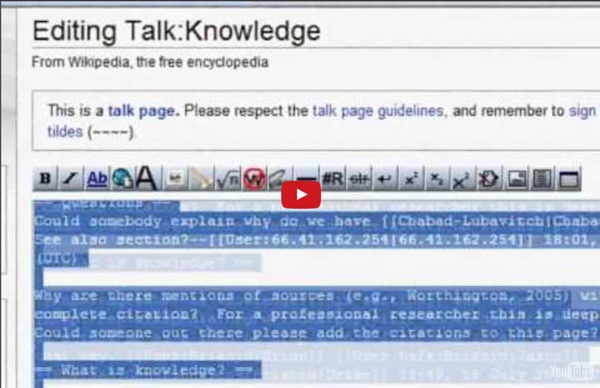



Michael Wesch Michael Lee Wesch (born June 22, 1975) is associate professor of cultural anthropology at Kansas State University. Wesch's work also includes media ecology and the emerging field of digital ethnography, where he studies the effect of new media on human interaction. Wesch is a cultural anthropologist and media ecologist exploring the effects of new media on human interaction. To this end, Wesch launched the Digital Ethnography Working Group, a team of undergraduates exploring human uses of digital technology. Wesch's videos are part of his broader efforts to pursue the possibilities of digital media to extend and transform the way ethnographies are presented. Currently he is the coordinator for the Peer Review of Teaching Project at Kansas State University, part of a broader nation-wide consortium of universities pursuing new ways to improve and evaluate student learning. Further reading[edit] External links[edit] References[edit] ^ Jump up to: a b "2008 National Winners".
L'ISC EN EQUATEUR Sosiaalisen median oppimisympäristö Mitä lisäarvoa opetukseen ja oppimiseen? Sosiaalisen median vertaaminen muihin opetuksen ja oppimisen apuvälineisiin on hankalaa. Kyse ei ole pelkästä esittämisen välineestä videon tai piirtoheittimen tapaan. Kyse ei ole pelkästä viestintäkanavasta puhelimen tai sanomalehden tapaan. Kyse ei ole pelkästä kohtaamispaikasta pihan tai luokkahuoneen tapaan. Oppijan käsiin annettu mobiililaite ei korvaa pelkästään kirjaa, vihkoa ja kyniä. Sosiaalinen media antaa oppimiseen monia mahdollisuuksia: vuorovaikutusvälineitä, yhdessä tekemisen apuneuvoja, julkaisemisen ja sisällön jakamisen tilaa, avoimia aineistoja, verkostoitumispaikkoja ja paljon muuta. Sopivasti valikoiden somea hyödyntäen voidaan tilanteesta riippuen saavuttaa erilaisia hyötyjä. Yhteistyöverkostoja ja avoimia sisältöjä Sosiaalinen media tarjoaa lukuisia välineitä ja foorumeja viestintään. Sosiaalinen media auttaa myös ylittämään erilaisia rajoja niin ajan, paikan, ihmisten kuin organisaatioiden välillä. Aktivoivaa oppimista
360VR Images - 360 Degree Virtual Reality interactive panoramic photography for virtual tours How Does Technology Facilitate Learning? Some of the first educational technologies were illustrations in 17th-century books and slate chalkboards in 18th-century classrooms. Educational technologies in the 20th century include lantern-slide and opaque projectors, later radio, and then motion pictures. During the 1950s, programmed instruction emerged as the first true educational technology, that is, the first technology developed specifically to meet educational needs. The introduction of modern computer technologies in classrooms has followed the same pattern of use. Later in the 1980s, educators began to perceive the importance of computers as productivity tools. The development of inexpensive multimedia computers and the eruption of the Internet in the mid-1990s quickly changed the nature of educational computing. Our conception of educational computing and technology use, described next, does not conceive of technologies as teachers or repositories of information. Learning With Technology How Technologies Foster Learning
ET&S [3(2)] - Maureen Tam - Constructivism, Instructional Design, and Technology: Implications for Transforming Distance Learning Constructivism, Instructional Design, and Technology: Implications for Transforming Distance Learning Maureen Tam Acting Director Teaching and Learning Centre Lingnan University, Tuen Mun Hong Kong, China Tel: +852 26167577 Fax: +852 25725706mtam@ln.edu.hk Introduction The paper proceeds in five stages. Secondly, the discussion ensues to identify and elaborate on those instructional principles for the design of a constructivist learning environment. Thirdly, the role of technology is examined for its support in the construction of constructivist learning environments. Fourthly, a link is established with distance learning. Finally, constructivism is critically appraised to identify some of its problems and limitations imposed on teaching and learning. What is constructivism? Constructivism is a fundamental departure in thought about the nature of knowing, hence of learning and thus of teaching. What is learning? 1. 2. a. b. 3. 4. Constructivism and Instructional Design (Lebow, 1993:5-6)
Sosiaalinen media ja oppiminen: iso kuva | Sometek Internetin kehityksessä voidaan erottaa vaiheet web 1.0, web 2.0 (≈sosiaalinen media) ja nupuillaan oleva web 3.0. Mistä näissä kehitysvaiheissa on kyse ja miten ne heijastuvat oppimiseen? Mitä ovat oppiminen 1.0, oppiminen 2.0 ja oppiminen 3.0? Yritän tässä artikkelissa hahmotella isoa kuvaa siitä, mistä tullaan ja minne ollaan menossa. Myötäilen tässä Jackie Gersteinin esittämää erinomaista jäsennystä. Viime vuodet puhe sosiaalisesta mediasta (=web 2.0) on kasvanut koulutusalalla, mutta käytännön opetuksessa ajatuksia toteuttaa vielä vähemmistö. Digitalisoituminen muuttaa kaiken Seuraavassa kolme kuvaa oppimisesta, internetin kehitysvaiheita seuraillen. Maalailen tässä isolla pensselillä, joten yksityiskohdat eivät ehkä ihan tarkkoina piirry. ”Tuotantolinja” – oppiminen 1.0 ja web 1.0 Teollisuusyhteiskunnassa yritysten valmistamia tuotteita ja asiantuntijoiden tuottamia sisältöjä tuotettiin massoittain ja levitettiin identtisinä kuluttajille. Koulu = tehdas? Mutta mitä on todellisuus?
Mervi Mavendorf´s Blog | Mervi Mavendorfin seikkailut sosiaalisessa mediassa